Rachel Held Evans's Blog, page 8
April 1, 2015
The Women of Holy Week, Part 1: Why the Women Matter

When referring to the earliest followers of Jesus, the Gospel writers often speak of two groups of disciples: the Twelve and the Women.
The Twelve are the dozen Jewish men chosen by Jesus to be his closest companions and first apostles, symbolic of the twelve tribes of Israel. The Women are an unspecified number of female disciples who also followed Jesus, welcoming him into their homes, financing his ministry, studying his teachings, and often instructing the Twelve through their acts of faithfulness and devotion.
Just as Jesus predicted, most of the Twelve abandoned him at his death (John 16:32). But the women remained by his side—through his death, burial, and resurrection. It is during Holy Week that the stories of these women really shine.
So for the duration of Holy Week, I’ll be reposting a series I first published in 2012 about the women who loved Jesus through his Passion. The series has been updated and edited, and I’ll include some fresh art and ideas. We will reflect on the woman who anointed Jesus at Bethany (Thursday), the suffering of Mary of Nazareth (Friday), the women who waited through a long Sabbath before heading out to the tomb on Sunday morning (Saturday), and the story of Mary Magdalene (Sunday).
It is easy to dismiss the women of Holy Week, to say their presence at critical moments in the Easter story is inconsequential, holding no significance in modern-day conversations about gender equity in the Church. But I’m not convinced it’s an accident that the first person to declare that Jesus had risen from the dead (to a group of skeptical men!) was a woman. I’m not convinced it’s unremarkable that God chose a woman to anoint the Messiah with oil and a mother to hear his cries from the cross.
When the rest of the world had given up on Jesus for failing to look like the liberator they expected, the women stuck around. They stuck around because before Jesus was a king, Jesus was their friend. And friends love one another through uncertainty, pain, fear, disappointment and even death.
Jesus inaugurated his new kingdom in the presence of women. And yet in many of our churches, women are still treated as second-class kingdom citizens, prohibited because of their gender from being the first in their congregations to stand at a pulpit and declare, “He has risen!”
So it’s as important as ever that we tell these women's stories.
I’ll leave you with one of my favorite quotes from Dorothy Sayers’ essay, “Are Women Human?”
"Perhaps it is no wonder that the women were first at the Cradle and last at the Cross. They had never known a man like this Man—there never has been such another. A prophet and teacher who never nagged at them, never flattered or coaxed or patronized; who never made arch jokes about them, never treated them either as ‘The women, God help us!’ or ‘The ladies, God bless them!’; who rebuked without querulousness and praised without condescension; who took their questions and arguments seriously; who never mapped out their sphere for them, never urged them to be feminine or jeered at them for being female; who had no axe to grind and no uneasy male dignity to defend; who took them as he found them and was completely unselfconscious.
There is no act, no sermon, no parable in the whole Gospel that borrows its pungency from female perversity; nobody could possibly guess from the words and Jesus that there was anything ‘funny’ about woman’s nature. But we might easily deduce it from His contemporaries, and from His prophets before Him, and from His Church to this day. Women are not human; nobody shall persuade that they are human; let them say what they like, we will not believe, though One rose from the dead."


March 31, 2015
Free Gifts, New Video: "Resurrection"
To celebrate the launch of Searching for Sunday we're giving away free gifts to everyone who who buys Searching for Sunday and submits their proof of purchase by April 18th, 2015 at 11:59 p.m. EDT.
For example, you could start reading Searching for Sunday today! Even though the book doesn't officially release until April 14th, you can have access to the first three chapters right after you submit your proof of purchase. Learn more about this and the other free gifts - including art, a discussion guide, and signed bookplates - on the Launch Celebration page. (If you've already pre-ordered, you are included.)
And finally, since it's Tuesday, here's the latest video excerpt:
You can see all the videos by visiting the book page.


March 30, 2015
"Are culture war 'victories' worth the casualties?"

I’m over at CNN today posing that question. A couple excerpts:
“This is the tragic irony of the culture wars: The casualties tend to be the very people Jesus went out of his way to serve: the poor, the sick, the marginalized, the outcasts, the people ostracized and deemed "sinners" by the religious elite. And when the world sees Christians hurting rather than helping such people, in the name of political gain, our testimony is profoundly diminished”…
***
“So to the culture warriors, I plead: Before you wage the next campaign, assess the potential collateral damage and ask yourself if it's worth it. Remember that the fruit of the Spirit is not power or might, influence or entitlement. The fruit of the Spirit is love, joy, peace, patience, kindness, goodness, faithfulness, gentleness, and self control, and "against such things, there is no law" (Galatians 5:23).”
“And to the wounded, I offer only this: You are not alone. Please know there are field medics -- pastors and priests, artists and activists, poets and parents and healers and dreamers -- ready to welcome you back to faith and to church whenever you're ready. We can walk the long road to healing together, even if it's with a limp.”
Read the whole piece here.


March 28, 2015
Sunday Superlatives 3/29/15

© 2009 Chris H, Flickr | CC-BY | via WylioOnline…
Cutest:
White House Science Fair Day
Funniest:
Trevor McMaken at Church of the Resurrection with “Holy Week Myers-Briggs”
“INFJ: St Catherine (of Siena) - You absolutely love contemplating unity with Christ and the beauty of the Eucharist during Maundy Thursday. You especially love contemplating this while hiding in the bathroom during the foot-washing portion."
Wisest:
Heather Plett with “What It Means to ‘Hold Space’ For People”
"What does it mean to hold space for someone else? It means that we are willing to walk alongside another person in whatever journey they’re on without judging them, making them feel inadequate, trying to fix them, or trying to impact the outcome. When we hold space for other people, we open our hearts, offer unconditional support, and let go of judgment and control."
Bravest:
Conservative Christians speak for gay rights law
“‘My education taught me to have compassion for gay people,’ said John Cremeans, a pastor who attended Bible school in Springfield. ‘But they were living outside Scripture, and not living a godly life. I believed there was a sin that could be corrected through prayer — until the day my son told me he was gay...’”
Best Interview:
Dave Eggers interviews Sufjan Stevens
Best Insights:
Elizabeth Esther at Her.Meneutics with “I’m Kimmy Schmidt, Minus the ‘Unbreakable’”
“For those of us who left isolationist, abusive, or restrictive religious environments, ‘making it’ in the outside world is often much harder than we expected. There is so much to learn and so much to unlearn. It’s disconcerting to realize that even though we’ve left the cult, the cult hasn’t left us. And many of us need therapy, support groups, and an ongoing commitment to “deprogram” harmful patterns of thinking. Even with a super-positive attitude like Kimmy’s, adjusting to mainstream America was bewildering.”
Best Response:
Eliel Cruz with “How the church perpetuates the ‘gay lifestyle”
“...Just as any other group of people have diverse interests and lead all sorts of lives – so do LGBT people.”
Best Conversation:
The authors of Forgive Us: Confessions of a Compromised Faith led an informative and challenging “teach in” on Twitter Wednesday night focusing on sins committed against women and girls and featuring a range of guests, including myself, Mimi Haddad, Deborah Brunt, Úna F. Lucey-Lee, Gail Song Bantum, and many others. You can see the highlights here.
Best Example:
Micha Boyett with “Choosing Love & Humility Over Rightness”
“Our doctrine doesn’t make us a church. What makes us a church is how we love the pregnant lady who needs to stay on the couch. What makes us a church is how we mop each other’s floors and take each other’s kids to the park. What makes us a church is how we learn to see one another as God’s beloveds, and speak kindness to one another even when our passion is loud and fiery. What makes us a church is how we choose love and humility over rightness.”
Most Awe-Inspiring:
Kelley Nikondeha with “For God So Loved”
“But something else struck me that afternoon. God has long loved the Cosmos. God doesn’t only love the part of creation that emerged in the final hours of a cosmic year. God loves it all and has been delighted by it all since January 1st some 13.8 billion years ago. God has lived in deep and lasting fidelity with creation for billions of years, this is a relationship with tender tenure and devoted durability across epochs of time and unfathomable kinds of increase.”
Most Eye-Opening:
Brittney Cooper with “We treat racism like it’s going extinct. It’s not.”
“The shock and surprise from white Americans about these continued incidents baffle me. These clear racist and racially-tinged occurrences happen with a kind of quotidian regularity. The question is why we think the problem of racism is an evolutionary problem rather than an ideological one. We treat racism as though it is the contained characteristic of a specific species of human beings known as racists, that lived in a prior era of American history, but have now nearly become extinct. We keep missing that racism is ideological and institutional, rather than merely individual. Or we treat racism like an outmoded technology, hoping that it will go the way of the rotary phone, the cassette tape and the VCR.”
Most Encouraging:
Latino evangelicals call for end to death penalty
“As Christ followers, we are called to work toward justice for all. And as Latinos, we know too well that justice is not always even-handed.”
Most Thought-Provoking:
Judith Shulevitz at The New York Times with “In College and Hiding From Scary Ideas”
“The confusion is telling, though. It shows that while keeping college-level discussions “safe” may feel good to the hypersensitive, it’s bad for them and for everyone else. People ought to go to college to sharpen their wits and broaden their field of vision. Shield them from unfamiliar ideas, and they’ll never learn the discipline of seeing the world as other people see it. They’ll be unprepared for the social and intellectual headwinds that will hit them as soon as they step off the campuses whose climates they have so carefully controlled. What will they do when they hear opinions they’ve learned to shrink from? If they want to change the world, how will they learn to persuade people to join them?”
Most Honest (nominated by Janette Platter)
Jo McElroy Senecal at the New York Times with “Bearing Witness”
“Whether a newborn, a toddler or teenager, a middle-aged or thoroughly wrinkled soul, when they are too sick to get out of bed and their breath is ragged and their hands are starting to curl into their palms, they are the sacred vulnerable and it is up to the ones standing to take good care. If you have a habit of being surprised by life’s mysteries, if you’re drawn to the myriad layers of human experience, if you feel compelled, called, and really, really want to be there as someone is dying, go all in. Because you will carry with you the imprint of those final weeks or days or moments, someone else’s breaths, and you’ll remember the gifts, eventually.”On My Nightstand…
Rilke’s Book of Hours: Love Poems to God: I am EATING UP this translation by Anita Barrows and Joanna Macy, which includes an informative introduction and a series of delightful notes written by the translators to correspond with each poem. The poems themselves are of course transcendent, and revisiting them at this time in my life has rekindled my love for Rilke’s work and invited me to see it with new eyes. The narrator’s relationship with God in these poems is tender, complicated, dark, and disarmingly sincere. I would go so far as to say it is relatable— in deeply profound and moving way. Highly recommended for fellow “searchers” during this holy season.
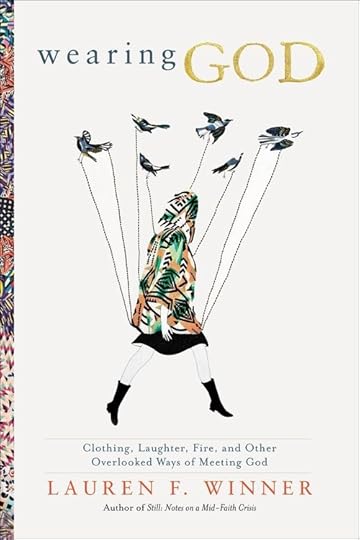
Wearing God: Clothing, Laughter, Fire, and Other Overlooked Ways of Meeting God by Lauren Winner: I will read everything Lauren Winner writes forever and always, but her latest (which officially releases this week) has been a special treat.
Exploring some of the lesser-known metaphors and imagery employed by biblical authors to describe God, Winner lyrically invites the reader to imagine God as clothing, laughter, flame, food, wine, and a laboring woman.
As someone whose Dictionary of Biblical Imagery makes for regular causal reading, I am loving every word. (If you read Searching for Sunday you will see Lauren and I share a fascination with some of the same colorful passages of Scripture.) This book proves that biblical scholars/theologians shouldn’t be the only ones elucidating the sacred text. We literary types have some notes too!
Searching for Sunday News…
I am tickled pink that Searching for Sunday received a coveted starred review in Publisher’s Weekly:
“Dividing the book into sections named after sacraments, Evans begins by contemplating, in lyrical prose, the theological significance of each sacrament's key ingredient (water, bread, ash, etc.). A powerful storyteller, Evans captures transformative moments, such as leaving a church full "of kind, generous people"; investing wholeheartedly in a new church that "collapsed slowly, one week at a time"; and witnessing healing at the Gay Christian Network's conference, feeling "simultaneously furious at Christianity's enormous capacity to wound and awed by its miraculous capacity to heal." Honest and moving, this memoir is both theologically astute and beautifully written.”
The book does not officially release until April 14, but a few advance review copies (ARCs) have made it into readers’ hands, and you can follow their responses on social media using #SearchingForSunday:
"Searching for Sunday" is literally the book @rachelheldevans was born to write. It sings & soars from start to finish. I hope you read it.
— Jonathan Martin (@theboyonthebike) January 25, 2015
"What makes the Gospel offensive isn't who it keeps out, but who it lets in." - @rachelheldevans in her new book #SearchingForSunday
— Sarah Bessey (@sarahbessey) March 24, 2015
.@rachelheldevans is absolutely bringing it. #searchingforsunday #baptism #EasterSunday pic.twitter.com/YsSO9vG2MG
— Michael Palmer (@MichaelRPalmer) March 21, 2015
"God's tumbling through the world like white water on rock. There's nothing left but to surrender." #SearchingForSunday @rachelheldevans
— Amber Wackford (@AmberWack) March 28, 2015
Here are a few quotes and images for sharing:
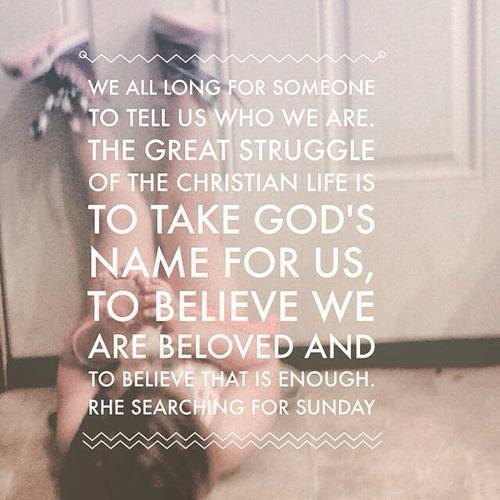
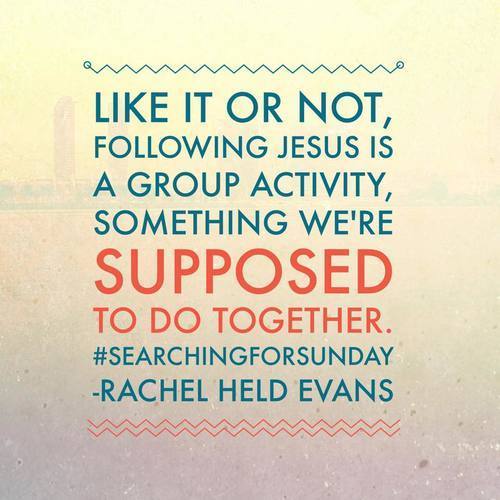
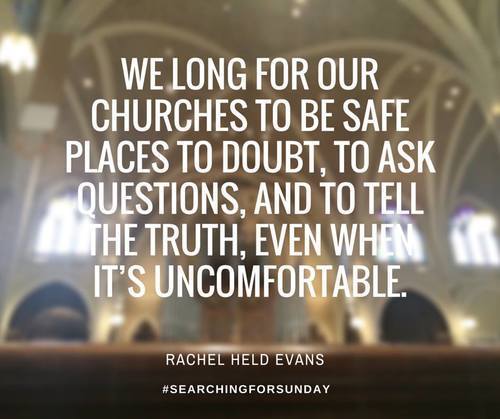
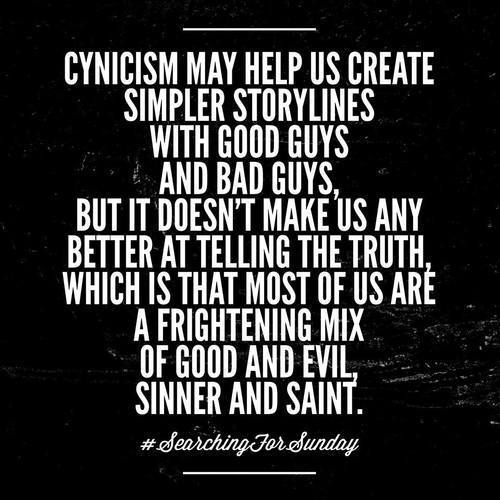
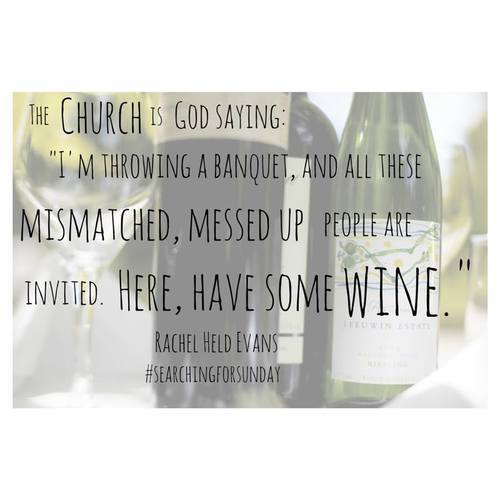
You can also find several interviews about the book at Religion News Service, Englewood Review of Books, and Religion Dispatches.
Finally, check out the three video excerpts created by Dan Evans (of “Dan is Awesome” fame) and Jason Erickson: “Table,” “Scars,” and “Sacraments.”)
Pre-order Searching for Sunday here. Next week we’ll be announcing some cool giveaways for those who order (and have ordered) early!
***
So, what caught your eye online this week? What happened on your blog?


Why Christians are Wrong about Joy (by Margaret Feinberg)
Today I am thrilled to share a guest post from a woman of valor I have long admired—Margaret Feinberg. Margaret is a popular Bible teacher and speaker whose books, including The Organic God, The Sacred Echo, Scouting the Divine, and Wonderstruck and their corresponding Bible studies, have sold nearly one million copies. In July 2013, Margaret was diagnosed with cancer. She shares her harrowing journey in her latest book and Bible study, Fight Back With Joy: Celebrate More. Regret Less. Stare Down Your Greatest Fears. You can learn more at www.margaretfeinberg.com. Follow Margaret on Twitter @mafeinberg.
***
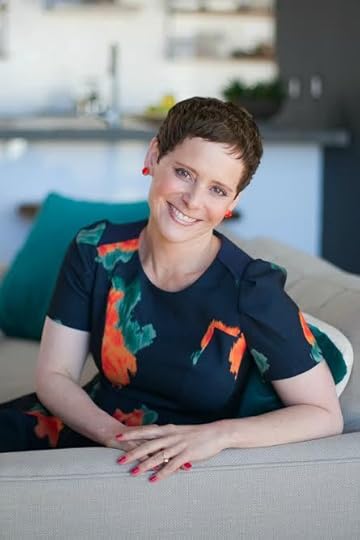
Many Christians argue that being joyful is better than being happy—and they’re dead wrong.
Over the years, I’ve listened to countless sermons suggesting that joy is the ultimate prize and happiness is a booby trap. Steer clear. Those cheery feelings are waiting for an opportune moment to pull a bait-and-switch on you. And you’ll be sorry.
Perhaps the pastor never put it in those terms, but that felt like the takeaway.
Joy rises above circumstances. Happiness will sink you.
I spent decades giving the stink eye to happiness and waiting for joy to take up residence in my life. But I was never confident if joy was at home in me. Maybe she was napping in the guest room or hiding in a closet.
Joy always felt elusive.
Three years ago, I decided to reexamine all I’d be taught. I paired studying the more than 400 references to joy and happiness throughout the Scripture with recent scientific studies on the subject. My research soon confirmed what the Scriptures tell us, namely, that many of the things we think will bring us happiness don’t. Contrary to people’s most common responses, money doesn’t bring happiness. Once a person’s most basic needs, including food, water, shelter, clothing, and health, are met, additional money has little power to increase happiness.(i)
Studies reveal that each of us is born with a set point for happiness. Though significant life events like losing a loved one or winning the lottery may result in temporary depression or elation, most people return to their happiness set point, which they oscillate around over the course of their life.
Genetics account for approximately 50 of a person’s happiness set point, and life circumstances such as gender, ethnicity, marital status, occupation, and religious affiliation account influence another 10 percent. But the remaining is a product of the way we think and act.(ii)
This suggests that though you and I have different natural dispositions, we can push ourselves toward the high or low end of our “set point” based on our thoughts and actions.
Now an abusive or toxic environment will override anyone’s happiness set point. The impact of violence, injustice, malnutrition, and extreme poverty cannot be trivialized. But assuming a person’s basic needs are being met, scientists are studying what external factors can bump up a person’s happiness set point.
They’ve discovered the things that actually bring happiness are long-term loving relationships, strong social connections, the opportunity to pursue meaningful work, a sense of optimism and openness to new experiences, as well as a spiritual belief or identification with an issue or idea larger than oneself.(iii)
I was fascinated that very items scientists identify as increasing our level of happiness are the very things that God calls us to as followers of Christ.
As we fulfill the great command to love God and love others, our long-term relations and connections to other will naturally grow stronger and deeper (Matthew 27:37-39). When we keep our eyes on God in our workplace, we naturally find more meaning and satisfaction in our labor (Colossians 3:24). As we walk in greater levels of faith, hope, and love, we can’t help but grow in optimism and a willingness to try new things (1 Corinthians 13:13). And those who give themselves fully to God will be filled with an inexpressible joy (1 Peter 1:8).
The research led me deeper into the Scripture where I began asking:
What if we can’t experience a fullness of joy apart from happiness?
What if the reason we have joy is not in spite of our circumstances but because of them?
What if the reason joy feels so elusive is because our definition of joy is too narrow?
I’m now convinced the writers of the Bible would say we have joy because of our great circumstances. As children of God, we are drenched in the grace and mercy of God. Joy and happiness walk hand in hand. You can’t give the stink eye one—you give it to both.
In fact, Scripture reveals joy as a spectrum of emotions, actions, and responses that includes happiness, gladness, cheer, merriment, delighting, dancing, shouting, exulting, rejoicing, laughing, playing, brightening, blessing and being blessed, taking pleasure in and being well pleased.
Discovering the fullness of joy means opening ourselves to the wide spectrum of ways God has wired us to experience it. Suddenly, joy isn’t elusive, but every day. It’s slips into our prayers when we say gracias. It tumbles in rumbles of laughter and dances when we lift our voice in praise. It curls on the couch as we embrace moments of deep shalom.
Throughout the Old Testament, the Hebrew word ‘asher describes a person pronounced “happy” or “blessed.” This word often appears within the context of the flourishing of God’s people: “Happy is that people, that is in such a case: yea, happy is that people, whose God is the LORD” (Psalm 144:15).
Throughout the New Testament, the Greek word makarios describes someone who is “happy” or “blessed” and is used. “Blessed are the poor in spirit for theirs is the kingdom of Heaven” can be understood as “Happy” are the poor in spirit. Jesus promised the makarios life when he said, “If ye know these things, happy are ye if ye do them” (John 3:17, KJV).
But here’s the dark irony.
I spent an entire year studying joy and happiness. With only two weeks remaining until I turned in a manuscript that included these discoveries, I felt a lump on my chest.
I soon discovered I had breast cancer.
The diagnosis trashed my book. I had been pursuing and activating joy in my life in the relatively good times, now I had to do it in the midst of darkness, depression, torturous pain.
No one signs up for that assignment. No one.
But let’s be honest. Sooner or later we all find ourselves on a battlefield of life. Sometimes you pick the fight. Sometimes the fight picks you. Mine was a diagnosis. Maybe yours is divorce, foreclosure, unemployment, or the death of someone you adored.
In these moments, we must choose how we respond. Anger. Bitterness. Cynicism. Slipping into a funk no one can rescue us from.
What if we chose to fight back with joy?
Over the last 20 months, I’ve been learning through great suffering and torture that more than whimsy, joy is a weapon we use to fight life’s battles. Because sometimes you have to poke holes in the darkness until it bleeds light.
If you like your joy sugary sweet, you’re going to hate Fight Back With Joy.
And honestly? I’m okay with that.
If you like your joy served up gritty, honesty and real, then you just might find a new friend and kindred spirit.
Because to lay hold of this deeper, richer joy, we’re going to have to let go of what we thought we knew to discover what God wants to give us.
***
i. http://www.earth.columbia.edu/sitefil...
ii. http://health.usnews.com/health-news/...
iii.Braun, Stephen. The Science of Happiness: Unlocking the Mysteries of Mood. (New York: John Wiley & Sons), 2000. pp. 35-36.


March 27, 2015
My Parents
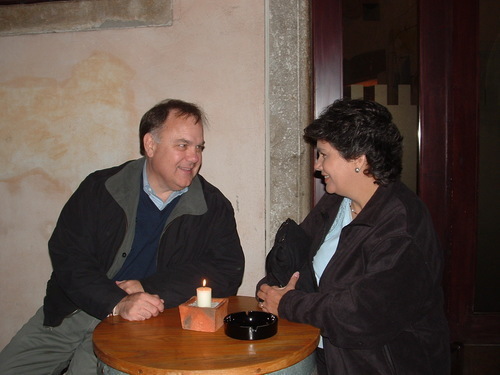
It’s far and away the most common question I get asked.
You pose it in the comment section, at book signings, during the Q&A session after a talk, in emails and tweets and handwritten letters.
What about your parents? you ask. Do they approve of all these changes in your faith? How have they reacted to your questions and doubts? What is your relationship like?
And I know that for many, there is a question behind the question…and often a world of hurt too.
I remember the young woman in Nashville who pulled me aside, tears brimming in her blue eyes, to tell me about how her mother worried about her, argued with her, and was deeply disappointed in her…for going to seminary and becoming a pastor (when “the Bible clearly teaches” women cannot serve in such a way). I remember too the college student in Seattle who straight-up begged, Can you PLEASE write a letter to my parents and tell them that just because I vote for democrats doesn’t mean I’m going to hell! I’ve listened as a whole group of twenty-somethings exchanged stories of awkward interventions and emotional meltdowns and dramatic lines-in-the-sand, all over differences of opinion regarding theology or politics or ecclesiology.
There are parents who refused to attend their grandkids’ baptism (because they didn’t approve of the method), parents who scheduled pastoral counseling sessions on behalf of their kids (because they were afraid Biology 101 had convinced them to accept evolution), parents who—somewhat endearingly—gift the black sheep of the family a different apologetics book every Christmas (because Lee Strobel is better than socks!). And of course there is the gut-wrenching story of the young man worked up the courage to come out to his parents only to be told by his father, “this is worse than if you had died.”
Lord, have mercy.

Easter Bonnets Circa 1985
When I hear these stories, I empathize, but I can’t relate.
Because my parents have been wonderful.
We don’t always agree on theology or politics, (the 2016 election promises to raise the pitch of our dinner conversations a few decibels), but my parents have always prioritized maintaining our relationship over maintaining ideological uniformity.
They never expected their kids to turn out just like them. They never expected my sister and me to parrot their opinions. Rather, they raised us to think for ourselves, to disagree gracefully, and to tell them the truth without fear of judgment. Even when the local gossip flared up around my supposed apostasy, my parents weren’t ashamed. On the contrary, they bragged. They hung articles about me on the refrigerator and shared pictures on Facebook of me preaching from a pulpit (an act forbidden in the church in which I grew up). They were, and are, proud of me. They are glad that I am following Jesus— even if it’s in my own way, even if it’s with The Book of Common Prayer tucked under my arm.
It has taken me a long time to appreciate the gravity of that, the gift of it.
I cannot imagine what would have happened if, in those first scary years of doubting and deconstructing my faith, my parents had responded like so many of my friends and tried to fix me. Even when I blustered and fulminated and foolishly rocked the boat for the sake of rocking it, they refused to treat me like a problem or an embarrassment or something to fear. They loved me unconditionally.
And I’m pretty sure their response helped preserve my faith.
I’m certain it preserved our relationship.
Which is why there are times when I want to track these other parents down, grab them by the shoulders and shout: Don’t you get it?! The easiest way to alienate your child for good is to make your love and acceptance of them conditional upon what they believe! Are your political and theological convictions really more important than that relationship?
One of the most destructive mistakes we Christians make is to prioritize shared beliefs over shared relationship, which is deeply ironic considering we worship a God who would rather die than lose relationship with us.
I’m often asked about how to preserve important relationships in the midst of doubt and change. (In fact I’m thinking of making this a theme in the next book.) There is much that could be said about this, of course, and I've learned much of what I've learned from making mistakes, but I think the most important thing is this: Invest in love. Risk in love. Because as the apostle Paul put it, “three things will last forever—faith, hope, and love—and the greatest of these is love.” Beliefs will change, political and theological convictions will alter, even faith and hope will falter. But "love never fails."
God does not demand that we all agree. God only asks that we love one another well.
No parent who loves their child unconditionally is a failure.
And sometimes love means biting your tongue and holding back, even when you don’t understand or agree or approve. Unity does not require uniformity.
I’m so grateful for my parents, and for my sister and for Dan, who have loved me through a whole lot of religious change—which has often been public and often been clumsy. And as I finally find myself settling into something of a steady rhythm of faith (dappled, as always, with doubt), it is made all the sweeter by the steadfast love of my mom and dad, which is one of the few things in the world I have never had to question.
***
Be sure to check out my dad’s guest post from a few years ago: “For Parents of Doubting Children.”
I’d love to hear from you. How have you managed your most important relationships in the midst of religious doubt and change? What mistakes have you made? What have you learned? Which responses have helped and which have hurt?


March 25, 2015
On “Going Episcopal”
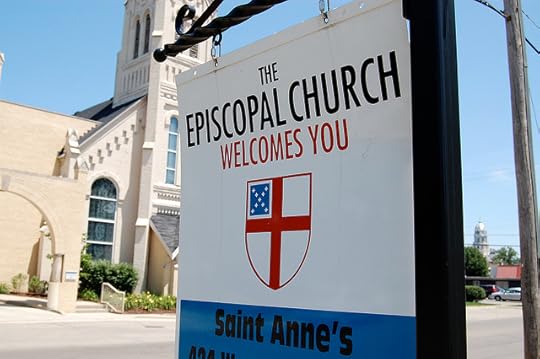
© 2007 Jerry Richardson, Flickr | CC-BY | via Wylio
As you may have noticed, I’ve watched with some consternation as headlines about the (not-so-revelatory) disclosure that I attend an Episcopal church declare that I’ve “left evangelicals for Episcopalians,” “dropped evangelical pretense for mainline Christianity,” and “departed evangelicalism to embrace a couch potato, cafeteria-style Christianity.”
It’s been disheartening to see what I consider to be a very pro-church, pro-ecumenical book get spun as a battle of denominations, complete with winners and losers based on membership numbers.
"Oh yeah?!" the critics say. "Well your precious Episcopal church is full of old people and is DYING so don't get too comfortable!"*
...All in Christian love, of course.
I’ve no right to complain. As one straight-shooting reader put it: “You can’t pitch the media ideas and then write their headlines for them. Coverage is coverage. Toughen up.”
Indeed, the headline “Author Describes Journey In and Out of Church Through the Imagery of Seven Sacraments” is far less interesting than “Author Gives the Middle Finger to Evangelicalism For the High of Smells and Bells.”
…So I guess I can just deal with the fact that I'm an artist who is super misunderstood and stuff.
But the response reveals something of the way we tend to think about our faith traditions—as systems to either accept or reject rather than little cultures that (for better or worse… or, more likely, a bit of both) indelibly shape how we think, who we know, what we fear and long for and love. For me, faith has never been a matter of conversion; it’s been a matter of evolution, of gradual change over time. I carry traits from every season, every age.
As Searching for Sunday makes clear, I am profoundly grateful to evangelicalism and the first people to introduce me to Jesus. They taught me to love and learn Scripture, to share my personal testimony, and to deliver a flawless lip synch performance to Newsboys’ “Shine” which I am certain will come in handy one day. And I haven’t exactly “converted” to the Anglican tradition. (I’ve not even been confirmed yet!) I just happen to worship with a community of Jesus-followers at an Episcopal church, where I’ve reconnected with the power of communion and the sacraments, and where I’ve been loved mightily for just showing up, even with my doubts in tow.
My experience is not unique, and while I’d stop short of calling it a trend, I know many evangelicals who have recently found a home somewhere in the Anglican Communion. (Last I checked the two terms are NOT mutually exclusive.) So here I’ve collected a series of blog posts about the from some of my favorite writers about their experiences on the Canterbury Trail:
Jonathan Martin with “On Going to (an Episcopal) Church”
“I believe this is the great hope for the unity of the Church: that though we may hold almost nothing else in common we, like the disciples on the road to Emmaus, know that somehow Christ is revealed to us around the table, and have burning hearts afterward to prove it. The experience of God in and through this meal gives us the resources to transcend the temporal boundaries that might otherwise divide us.”
Amy Peterson with “Woman, why are you weeping? [when your kid becomes Episcopalian]”
“[Going to an Episcopal church] doesn’t mean that I’ve rejected the authority of Scripture. This is how we used to say it, growing up: ‘That church has female preachers- clearly, they don't believe the Bible!"’While it's true that I've changed my mind about the place of women in church ministry, that hasn't happened because I chose cultural relevance over Scripture. That change came slowly, and it came through careful study of Scripture. You may have heard that the Episcopal church's position on gay marriage or evolution or Iraq or any number of things shows that we don't respect the Bible. But don't believe that until you talk to us about it. We read aloud from the Old Testament, the Psalms, the New Testament, and a Gospel every Sunday. I'm guessing that's more Scripture than is listened to in most non-denominational churches on most Sunday mornings. We have a high view of Scripture.”
Ben Irwin with “11 Things I Love About the Episcopal Church”
“Anglicanism has long been known as the via media, the “middle way” between two traditions. The Episcopal Church has also helped me navigate the middle way between unbelief and dogmatism. Ours is a faith handed down from the apostles, but not one so fragile that it cannot cope with science, with new findings about the origins of the universe, ourselves, or whatever else we might discover.”
Lindsey Harts with “Why I’ve Been Going to an Episcopal Church”
“I think that's why I can't manage to pull myself away from the Episcopal church right now. Everything is centered around this one moment where people of all ages, gender identities, races, ethnicities, sexual orientations, political beliefs, and backgrounds are welcome to come to the table and receive the elements. Whether or not the bread and wine are a symbol or whether you believe that they are the literal body and the blood are up to you. I believe they have enormous power to change hearts, attitudes, lives, tear down prejudices, bridge gaps, and bring peace. I believe that in most cases, the elements speak louder than any sermon or hymn or prayer. Something mysterious and unfathomably beautiful happens at the table. It's a place where any person, no matter what belief system or background they come from can come and receive the God of peace.”
Fred Clark with “Episcopalian and evangelical are not mutually exclusive categories” and “24 Warning Signs That Your Evangelical Friend Might Be About to ‘Depart’ for the Episcopal Church”
“#13. They think Jesus turned water into wine, not into Welch’s Concord Grape Juice.”
Scot McKnight with “My Anglican Journey”
Are there others?
Now, granted, all of these stories come from white, middle-class people, most with higher education. I’m not saying that these posts represent some wider trend, nor am I saying my experience ought to be everyone else’s. But if you too have found the Episcopal church of late, I hope they will be an encouragement that you’re not alone…and the Episcopal church welcomes you!
***
*By the way, this notion that we judge the health of a church based on numbers drives me crazy. We judge the health of a church community based on the fruit of the spirit it produces. And, not that it matters, but the Episcopal church of which I am a part is incredibly diverse in terms of age groups represented. I take communion with seniors, young professionals, college students, little kids, married couples, hipsters, gay couples, folks my parents age and folks my age. And there are three services each Sunday.


March 24, 2015
What brought me back to church…
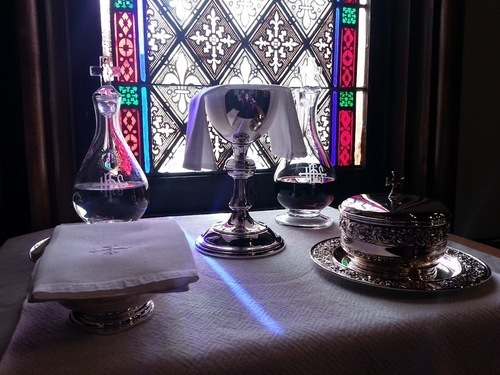
On Tuesdays, between now and April 14, I’ll be sharing excerpts from my new book, Searching for Sunday: Loving, Leaving, and Finding the Church. The book is arranged around seven sacraments—baptism, confession, communion, holy orders, confirmation, anointing of the sick, and marriage. When my faith had become little more than an abstraction, a set of propositions to be affirmed or denied, the tangible, tactile nature of the sacraments invited me to touch, smell, taste, hear, and see God in the stuff of everyday life again. They got God out of my head and into my hands.
Today I'm sharing the third of four video excerpts in a series produced by Daniel Evans and Jason Erickson. (Note: The video includes closed captioning.)
Watch the first video, "Table."
Watch the second video, “Scars.”
Watch the third video, “Sacraments.”


March 20, 2015
Follow Friday: Micky Jones
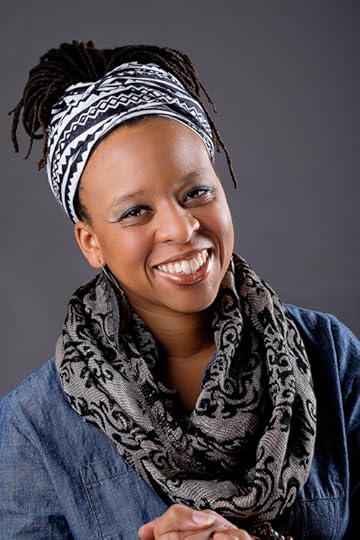
Todays’ “Follow Friday” features one of the wisest and humblest Christian leaders I’ve ever met—my friend and fellow Tennessean, Micky Jones.
Micky is an activist and student at the North American Institute for Indigenous Theological studies through George Fox Evangelical Seminary. The director of training and program development at TransFORM Network, she is a master curator, as skilled as anyone I’ve ever met at making connections, elevating important voices, and navigating relationships in communities of political, theological, and ethnic diversity.
But Micky’s official credentials don’t capture the woman of valor that shines through in her one-on-one interactions with others. It seems like every time I participate in a conference, synchroblog, or collaborative effort of some kind, Micky is there, making it all happen, with little fanfare around herself, but with a contagious enthusiasm for the people around her. In the midst of sometimes difficult conversations, she makes you feel like you matter, that your voice is important even when it wavers and even when you haven’t got it all figured out yet. She manages to be both brutally honest and unwaveringly kind.
Micky’s special interests include womanist theology, the intersections of Black and Native American history and theology, practical theology, nonviolent direct action, and health issues. Just in writing this post, I learned that Micky also has a background as a doula, childbirth educator, and lactation consultant. How cool is that?!
So if you’re looking for a fantastic curator to share the best of the best on Christianity and justice, be sure follow Micky on Twitter. You can also catch her on the Patheos “Emerging Voices” channel, at Homebrewed Christianity, and Sojourners.
If you want to join Micky in conversations around love for God, neighbors and justice, she will be hosting the Inhabit Conference on the West Coast April 17-18 in Seattle and the Transform Network Gathering on the East Coast April 23-25 in Washington D.C. We even have a coupon code for 20% off the Transform Network Gathering : MICKYJO if you want to join in!
See also:
Follow Friday: St. Lydia’s Church in Brooklyn
Follow Friday: April Fiet
Follow Friday: Tiffany Thomas


March 17, 2015
Searching for Sunday Excerpt: "Scars"
On Tuesdays, between now and April 14, I’ll be sharing excerpts from my new book, Searching for Sunday: Loving, Leaving, and Finding the Church. The book is arranged around seven sacraments—baptism, confession, communion, holy orders, confirmation, anointing of the sick, and marriage—and today’s excerpt comes from the marriage section. It’s also the second of four video excerpts in a series produced by Daniel Evans and Jason Erickson. (Note: The video includes closed captioning.)
Watch the first video, "Table."


Rachel Held Evans's Blog
- Rachel Held Evans's profile
- 1710 followers



